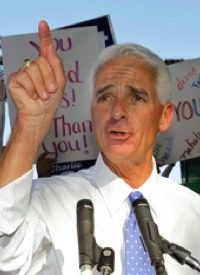
Florida Gov. Charlie Crist couldn’t have been expecting a fond farewell when he announced on April 29 he was leaving the grand Old Party. The party elders did not disappoint him.
"The question for Floridians is whether he will keep his word about all of the new promises he makes," Senator Mitch McConnell of Kentucky, the Republican leader, said in a statement released with other party leaders. "Elections are about trust and frankly, it is unclear whether Governor Crist deserves any."
Crist had obviously fallen out of favor with Republicans in his own state well before he made it official that he would drop out of the Republican primary and run for Florida’s open U.S. Senate seat as an independent. Once considered a shoo-in for victory in both the primary and general elections, Crist had even been considered a possible contender for the GOP presidential nomination in 2012. Then he embraced the Obama economic stimulus plan and, in the now famous "hug of death," literally embraced the President himself when Obama came to Florida to talk about the money coming to the Sunshine State and all the jobs it would create. Crist, a former state education commissioner and attorney general, recently vetoed an education bill passed by the Republican legislature that tie teachers’ pay raises to student performance in a move supporters said would make teachers and schools more accountable fro the quality of education. By the time he decided to drop out, polls were showing Crist running 23 points behind his conservative rival, Marco Rubio, a former speaker of the state House of Representatives. Last week former Vice President Dick Cheney became the latest of the nationally prominent Republicans to endorse Rubio.
But even as he did so, Cheney called on Crist to either stay in the primary contest or quit the race altogether. Crist’s decision to make it a three-way race in November undoubtedly gives him a better chance of winning. But it also opens the door to a potential victory by lesser known rival, Democratic Congressman Kendrick Meek, in a race in which the winner may only need a third of the vote. A Quinnipiac University poll taken two weeks ago showed either Crist or Rubio ahead of Meek by 14 points. But in a three-way race, it would be Crist with 32 percent of the vote, Rubio 30 and Meek 24. The advantage for Crist is that he draws a higher percentage of the vote from independents than among Republicans. The poll showed him getting only 30 percent of the Republican vote, 27 percent of Democratic voters and 38 percent of the independents. Rubio would get nearly two-thirds (64 percent) of the Republican vote, 29 percent of the independents and only five percent from the Democrats. Meek, on the other hand, draw no support from Republican voters, while 55 percent of the Democrat votes and 15 percent of the independents. The advantage for Meek is that there are 680,000 more Democrats than Republicans in Florida. And there is considerable potential for his lead among voters in his own party might to grow as he becomes better known. A whopping 73 percent of those surveyed in the Quinnipiac poll said they still don’t know enough about the South Florida Congressman to have either a favorable or unfavorable opinion of him.
Becoming better known in a state as large as large as Florida requires lots of money, however, meaning a good deal more than the $3.7 million the candidate now has. But if Meek can stay close through the summer and Democrats get the scent of a possible victory, it is likely more cash will start flowing his way. For now, he seems happy to be in a race where the spotlight until now has been almost entirely on two feuding Republicans.
"For those voices that have said we’re left out of the debate, I think we’re right smack in the middle of it," Meek said.



